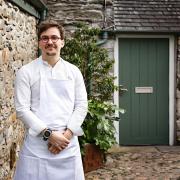A business which started making Kendal Mint Cake 100 years ago has expanded at a remarkable rate. Mike Glover reports

You can tell something rather different goes on at this otherwise routine factory and warehouses just over the north Lancashire border. Perhaps it’s the life-size, inflatable, fluorescent pink and yellow cow perched on the roof that gives it away.
Once inside, the signs on the doors give further clues to a certain level of eccentricity - they say Mission Control, Nerve Centre and Global Marketing.
Behind the office facade, scenes become even more surreal as you enter a world straight out of Willy Wonka and the Chocolate Factory.
Here an army of white-clad, hair-netted workers follow the trail of tons of that dreamy derivative of the cocoa bean.

For this is the headquarters of one of the UK’s most innovative and successful companies in the wonderful world of chocolate.
J E Wilson & Sons of Kendal, otherwise known as Creative Confectionery, has relocated to an industrial estate by the main line railway at Holme, near Carnforth.
For a hundred years Wilson’s had operated its mint-cake making factory in Kendal. But its centenary year was one of huge change, including the move to a new home.
In the middle of the move it bought a Wiltshire luxury chocolate company, shifting its machinery into the new complex.

Now in 2014 the company has virtually doubled its turnover from around £5 million a year to nearly £10 million.
The £2 million investment was partly paid for by a £500,000 loan package from the North West Fund, with HSBC’s Lancashire and Cumbria commercial team provided half of the cash to enable Wilson’s to relocate to a new 40,000 sq ft factory unit at Elmsfield Park near Holme.
An additional £250,000 from the North West Fund enabled the company to fit out and equip the new factory. This included the installation of new production lines.
Managing director Andrew Wilson said: ‘My great grandfather started the company in 1913 and we still make traditional Kendal mint cake to the same recipe today. Over the years we’ve diversified into chocolate manufacturing, so today Mint Cake accounts for a small part of our business.
‘Chocolate manufacturing is now our key focus and we provide a range of solid, filled and hand-decorated products. We used the funding package to ramp up our production capacity. We can now significantly increase the range of lines we supply.’
The turning point for Wilson’s, Andrew reflects, was shortly after adding chocolate to its range of products, mainly aimed at the tourist market, in the mid 1990s. These consisted of bars of chocolate sold in packages depicting Lake District scenery.
They were also into the hamper market which boomed during the 80s and 90s.
Then one management meeting someone complained about an issue ‘opening a can of worms.’ Andrew’s wacky sense of humour and willingness to try anything meant they started producing just that: ring-pull cans of chocolate worms.
They sold 30,000 cans in the first year and the company moved on to producing chocolate slugs, spiders, squashed hedgehogs, sheep poo and millennium bugs for 1999, all in cans, selling more than a million cans a year by 2000. The concept was exported world-wide.
Andrew admits these products and others appealed to his schoolboy humour, but they meant the company was getting into outlets like BHS, Debenhams, Waitrose and even Harrods.
Ten years ago the company purchased Duncan’s of Scotland, famous for once making Walnut Whips, and a gradual move up-market began. Every product has a shelf life and about five years ago the cans were phased out and the business changed again.
Now the company is better known for its quality products and is a contract manufacturer for most of the principal UK retailers and supermarket chains, although there are still some for Ann Summers that would make the average schoolboy blush.
Order books were bursting and the company works approximately 18 months ahead of seasonal sales, with Christmas, Easter, Valentine’s Day and Father’s Day dominating the merry-go-round of planning. At the time you read this, you may be concentrating on Christmas 2015. Andrew and his team will be focusing on Easter 2016.
It became obvious that the factory in Kendal was no longer fit for purpose. Andrew confirms a local legend that there was actually a pipe carrying chocolate under the public road from one part of the factory to another.
In spring 2013 he finally found the vacant units at Holme and the move was achieved during the rest of the year. It was not without its challenges, mainly getting machinery back to full out-put after the disturbance.
But the company has spent 2014 full pelt. Staff levels have risen from 50 full-timers (up to 90 in season) to 85 full-time (150 in season).
A new production line was installed for the lines bought from Delvaux in Wiltshire, who made those luxury small chocolates so beloved of the catering industry. Now, 100 million chocolates a year are sent out to restaurants all over the country from this one machine alone.
The numbers all round are mind-boggling: the factory handles 75 tonnes of liquid chocolate at any one time, with 1,000 tonnes a year being delivered by tankers to the new factory. It comes in milk, plain and white chocolate.
‘We have gone through a period of massive change, but it was also very exciting,’ added Andrew, who started with the company as a van driver in its wholesale business, aged just 17. Now 55, He shows no signs of slowing down.
The day we met, he was preparing for a meeting with potential partners with another bright idea to expand the product range.
That would mean another new line producing another 14 million chocolates over a four month period.
Let’s hope in this case it does open another can of worms.



























